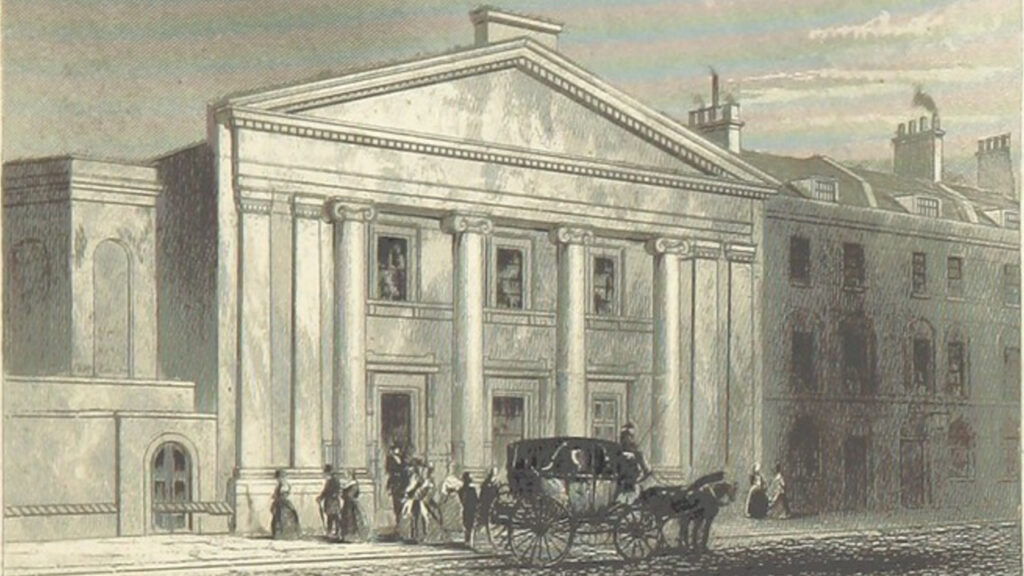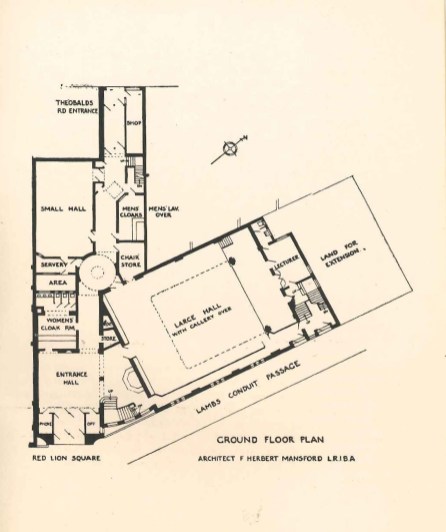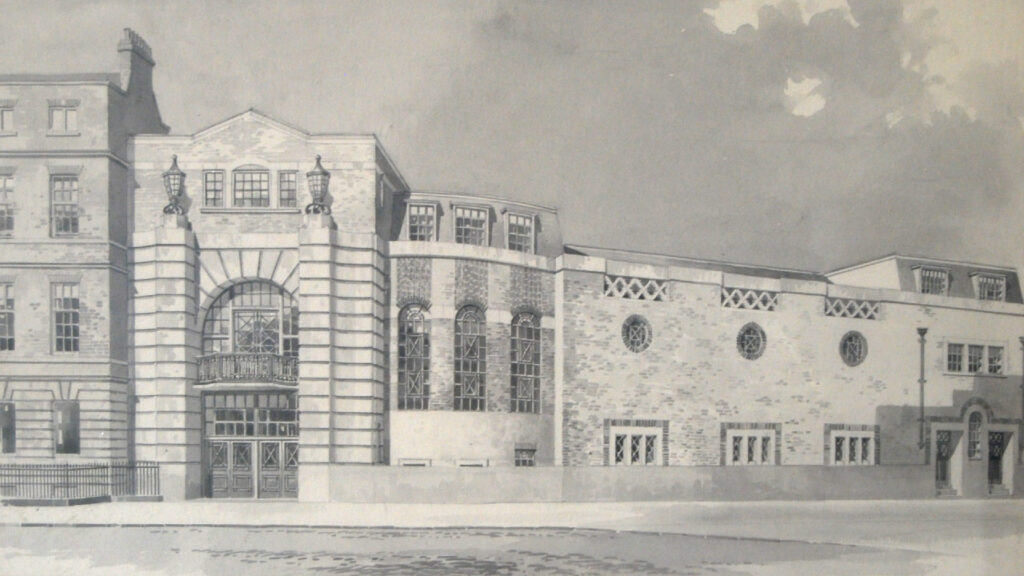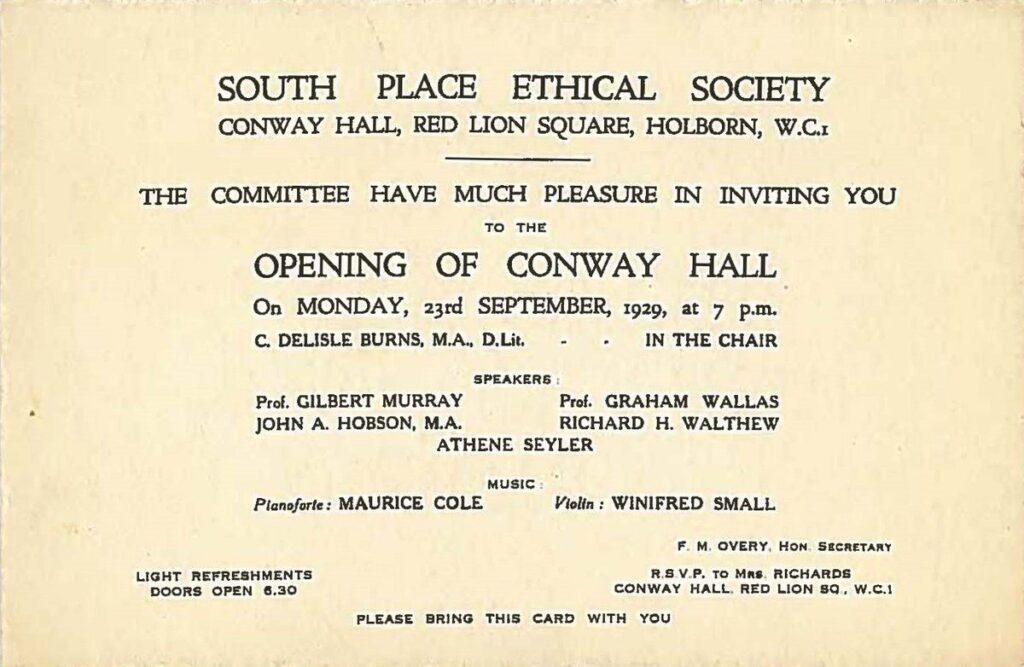Humanist Heritage: Conway Hall (original) (raw)
Conway Hall has effected a transformation. From the day of its opening the life of the Society has been full of energy and good cheer…
Report of the South Place Ethical Society, 1929/30
Conway Hall is a Grade II listed building in Red Lion Square, London, first opened in 1929 as the new home of the South Place Ethical Society. Named for Moncure Daniel Conway, abolitionist, freethinker, and former leader of South Place, Conway Hall was intended to embody and invigorate the humanist values of the Society, and to continue its lively programme of talks, debates, musical performances, and social activities. Today, it houses the Humanist Library and Archives, the largest and most comprehensive research resource of its kind in the United Kingdom.
It is the aim of the Trustees and Committee to place at the disposal of the members and visitors… Headquarters in the heart of London, where men and women of advanced thought could meet and enjoy the amenities of social discourse, with facilities for writing, rest and refreshment.
Pamphlet, 1927

South Place Chapel, Finsbury, former home of the South Place Ethical Society
Plans to build a new space for the growing South Place Ethical Society had been mooted in 1900, recognising the developing needs of the group, and the deterioration of their current building. The Society, first formed as a nonconformist congregation in the late 18th century, had been at the purpose-built South Place Chapel in Finsbury since 1824, and had evolved from a Unitarian congregation as they were in the 1820s, to a secular ethical society. In the two decades following the first proposal, financial limitations and the First World War impacted the Society’s ability to enact their vision, but after the Chapel was sold to the School of Oriental Studies in 1921, the Society were able to purchase – the following year – a suitable site in Red Lion Square.

Mansford’s Ground Floor Plan of Conway Hall. Conway Hall Humanist Library and Archives
In 1925, the Society purchased the freehold of 51 Theobalds Road, providing a second exit from the Red Lion Square Building. As architect, the Society’s committee appointed, ‘with practical unanimity’, Frederick Herbert Mansford, whose family had been active members of South Place since at least 1894. Mansford had trained with the prominent architect Alfred Waterhouse, whose famous buildings include London’s Natural History Museum. Over the following years, efforts continued to raise funds, and in 1928 building work began.

Conway Hall drawing, assumed to be by F. Herbert Mansford RIBA, c. 1926. Conway Hall Humanist Library and Archives
Conway Hall officially opened on 23 September 1929, with speeches from C. Delisle Burns, Gilbert Murray, Athene Seyler, and Graham Wallas. Also present were many pioneers of the organised humanist movement, including Gustav Spiller, Harry Snell, F.J. Gould, and Stanton Coit. Another prominent humanist, Laurence Housman, gave the Conway Memorial Lecture shortly afterwards, entitled ‘The Religious Advance Toward Rationalism’. Starting as they meant to go on, the Society was quick to host a diverse array of activities at Conway Hall, including lectures, concerts, dances, play-readings, socials, and discussion circles.

Invitation to the opening of Conway Hall, 1929. Conway Hall Humanist Library and Archives
Over subsequent decades, Conway Hall continued to welcome numerous notable figures, progressive groups, and major gatherings. The Conway Memorial Lecture, delivered annually since 1910, has been given by Marjorie Bowen, Kingsley Martin, James Hemming, Marghanita Laski, Margaret Knight, Jacob Bronowski, and Harold Blackham, to name only a few. The Sunday Concerts, initiated in 1887, now number well over two thousand, continuing a long tradition of humanist challenge to historic restrictions on secular Sunday entertainments. Remembering F. Herbert Mansford in his obituary of 1946, the writers of the Ethical Record noted his contribution, not just to the Society itself but to the community at large:
When the building was completed in 1929 it gave great satisfaction, not only to its owners, but also to the numerous organizations that have made use of it from time to time.
Conway Hall today continues to host a wide variety of lectures, classes, performances, community, art, and social events. It remains a widely-known centre for free speech, independent thought, and the celebration of humanist values. As a Listed Building, it is noted for its ‘elegant design’, ‘grand classical entrance bay’, and ‘quality materials’, as well as its singularity
as the headquarters of the South Place Ethical Society, a long-standing, free-thinking organisation to which a number of important figures have been connected in the past.